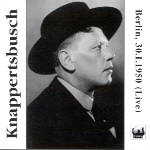Just for the record, Tahra offers the best sounding incarnation so far of the January 30, 1950 Berlin Philharmonic concert conducted by Hans Knappertsbusch. Under Kna’s heavy-handed leadership, however, Schubert’s “Unfinished” might be subtitled the “Endless”! You’ll have to search far and wide to hear a professional performance of the “Unfinished” played to this conductor’s flabby, shapeless, and undisciplined specifications. The Allegro moderato begins at a deathly crawl, and Kna’s last-ditch attempts to speed things up at climactic moments fail to salvage the tentative transitions, cracked entrances, slack phrasing, and spotty intonation. And before you assign the blame only to the conductor’s unusually slow tempos, consider Klemperer/Philharmonia and Giulini/Bavarian Radio “Unfinisheds”, for example, which are equally broad and deliberate yet boast tighter rhythmic control and scrupulous ensemble values.
Knappertsbusch fares no better in Bruckner’s Ninth. For starters, he opts for Ferdinand Lowe’s spurious edition of the score, which offers all sorts of bizarre reorchestrations and misguided textural tweaks. Second, the orchestra plays poorly much of the time, particularly in the composer’s numerous soft, exposed passages. Third, Kna’s habit of whipping up the pace as the music grows loud becomes increasingly predictable. By contrast, the conductor melodramatically lingers over the Scherzo’s Trio, where the strings throb and sigh to cloying, vulgar effect. What’s more, the brass are miked so closely that aural fatigue sets in long before the symphony concludes. Interestingly, a dress rehearsal was taped two days before the concert (released on Tahra TAH 207/8). Although it corrects none of the interpretive and textural mayhem I find here, it sports marginally cleaner playing and a better-balanced recording.
A laggard Beethoven Coriolan Overture and undistinguished Wagner Parsifal Prelude (relative to the conductor’s superb version at the outset of his 1962 recording of the complete opera) fill out this set. I suppose Kna’s Bruckner Ninth preserves a way of interpreting this composer that has long passed into oblivion, and would have remained there but for the existence of historic CD reissues such as this one. Is that a good or bad thing? Reread my comments and decide for yourself.
































